Remembering LBJ
June 29, 2009
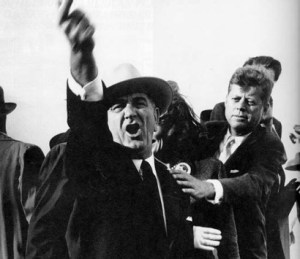 The presidency of LBJ coincides roughly with my teenage years. Looking back, his presence looms large over my passage into adulthood. Most of us who are old enough to remember Lyndon Johnson will probably recall the vivid last months of his presidency. The American public had grown tired and disillusioned with the Vietnam War, and maverick Senator Eugene McCarthy had won surprising early primary victories against a sitting president. The final blow was the entry of Robert Kennedy into the primaries – even the brother of his ticket mate had turned against him.
The presidency of LBJ coincides roughly with my teenage years. Looking back, his presence looms large over my passage into adulthood. Most of us who are old enough to remember Lyndon Johnson will probably recall the vivid last months of his presidency. The American public had grown tired and disillusioned with the Vietnam War, and maverick Senator Eugene McCarthy had won surprising early primary victories against a sitting president. The final blow was the entry of Robert Kennedy into the primaries – even the brother of his ticket mate had turned against him. LBJ has been part of my family history for as long as I can remember. My maternal Grandmother voted for the young Congressman in the depths of the Great Depression. It didn’t take long for LBJ to gain the fierce loyalty of his poor rural constituency.
It was the common wisdom of the day that a Republican could not be elected dogcatcher in Texas. The loyalty to Johnson (and the Democratic Party) would last for decades. Not until Nixon’s “Southern Strategy,” would the tide begin to turn. Along with the new prosperity, a wave of Republicanism swept the Lone Star State. It seemed Texans had forgotten their humble past.
Certainly LBJ never forgot his past. He was born in 1908 near Stonewall, in a small farmhouse on the Pedernales River. Despite the poverty of his childhood, this land never lost its hold on him. As family fortunes improved, Congressman (and later Senator) Johnson built a sprawling
ranch home that became a hub of political activity.
The LBJ Ranch is now a part of the National Park System, and is open to the public. Rangers lead guided tours of the home (no interior photographs are permitted, unfortunately). The residence, although large, is quite unpretentious, with plain furnishings. It’s very little different from other ranch dwellings of the era.
In the old airplane hanger are some of LBJ’s favorite vehicles. I love the Ford Phaeton from the thirties and the classic Continentals. One of Johnson’s infamous pranks was to take foreign dignitaries on a tour of his ranch, head straight for the water, and scream “the brakes are out!” Of course, he neglected to mention the convertible they were riding in was amphibious.
———-
Johnson was the greatest master of getting things done in Washington. His powers of persuasion were honed to perfection in a technique known as “The Treatment.“
“Historians Caro and Dallek consider Lyndon Johnson the most effective Senate majority leader in history. He was unusually proficient at gathering information. One biographer suggests he was “the greatest intelligence gatherer Washington has ever known”, discovering exactly where every Senator stood, his philosophy and prejudices, his strengths and weaknesses, and what it took to win him over. Robert Baker claimed that Johnson would occasionally send senators on NATO trips in order to avoid their dissenting votes. Central to Johnson’s control was “The Treatment”, described by two journalists:
The Treatment could last ten minutes or four hours. It came, enveloping its target, at the LBJ Ranch swimming pool, in one of LBJ’s offices, in the Senate cloakroom, on the floor of the Senate itself — wherever Johnson might find a fellow Senator within his reach.
Its tone could be supplication, accusation, cajolery, exuberance, scorn, tears, complaint and the hint of threat. It was all of these together. It ran the gamut of human emotions. Its velocity was breathtaking, and it was all in one direction. Interjections from the target were rare. Johnson anticipated them before they could be spoken. He moved in close, his face a scant millimeter from his target, his eyes widening and narrowing, his eyebrows rising and falling. From his pockets poured clippings, memos, statistics. Mimicry, humor, and the genius of analogy made The Treatment an almost hypnotic experience and rendered the target stunned and helpless.”
-
 Image via Wikipedia
Image via Wikipedia
Related articles by Zemanta
- Lessons From Lyndon’s Successful Failure (thenewnixon.org)
Elegy for a Dead Soldier
May 28, 2009
 Image via Wikipedia
Image via Wikipedia
My father died yesterday. It was surprise and a shock, of course; you can never be ready for the death of a parent. Dad was a young man during the Great Depression, and learned the craft of carpentry serving in the Civilian Conservation Corps. He joined the Navy after Pearl Harbor, later island hopping throughout the Pacific with the Seabees (somewhere we still have the set of dominoes he meticulously carved from native mahogany).
Becomes an altar, two small candlesticks
Sputter at each side of the crucifix
Laid round with flowers brighter than the blood,
Red as the red of our apocalypse,
Hibiscus that a marching man will pluck
To stick into his rifle or his hat,
And great blue morning-glories pale as lips
That shall no longer taste or kiss or swear.
The wind begins a low magnificat,
The chaplain chats, the palm trees swirl their hair,
The columns come together through the mud…
The military dead. We lift and fold the flag,
Lay bare the coffin with its written tag,
And march away. Behind, four others wait
To lift the box, the heaviest of loads.
The anesthetic afternoon benumbs,
Sickens our senses, forces back our talk.
We know that others on tomorrow’s roads
Will fall, ourselves perhaps, the man beside,
Over the world the threatened, all who walk:
And could we mark the grave of him who died
We would write this beneath his name and date:
Underneath this wooden cross there lies
A Christian killed in battle. You who read,
Remember that this stranger died in pain;
And passing here, if you can lift your eyes
Upon a peace kept by a human creed,
Know that one soldier has not died in vain.
You may also enjoy You Can Go Home Again
.
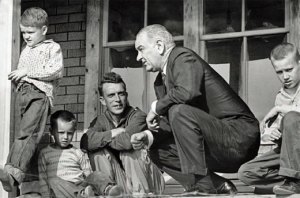
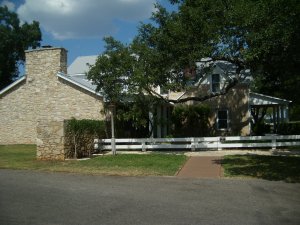
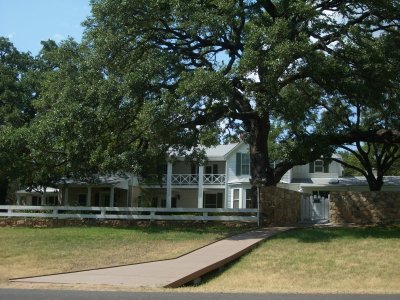
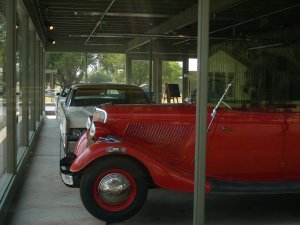
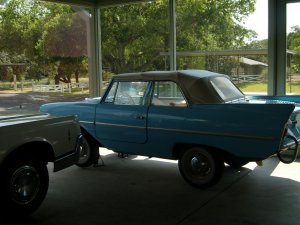
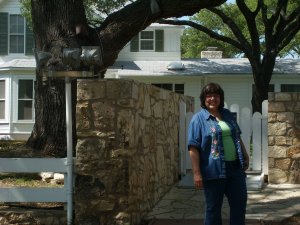
![Reblog this post [with Zemanta]](https://i0.wp.com/img.zemanta.com/reblog_e.png)